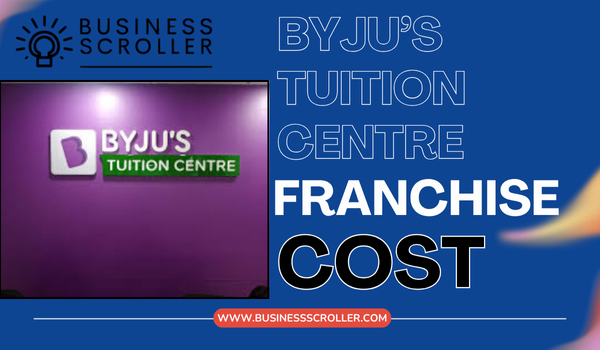BYJU’S Learning Centres (often called BYJU’S Tuition Centres or BTCs) brought the country’s biggest ed-tech brand into offline classrooms: tech-enabled coaching centres that combine app-driven content with in-person mentoring. If you’re evaluating a BYJU’S franchise (or tuition-centre partnership) as an investor or education entrepreneur, this guide walks you through the franchise models you’ll encounter, realistic cost ranges, ROI expectations, eligibility, and the exact steps to apply — plus practical tips and red flags. I used official pages and multiple franchise directories to build conservative, real-world figures; always request BYJU’S current commercial sheet before committing funds.
Quick Reality Check (why verify everything)
BYJU’S is a very large, complex organisation and its offline strategy (BTCs / Learning Centres) has changed over time. The company has also faced high-profile financial and operational headwinds in recent years — this affects hiring, centre count and commercial terms in some markets. Treat published franchise numbers as indicative and insist on a written, up-to-date offer from BYJU’S corporate team.
Franchise / Centre Models you’ll see
- Standard BYJU’S Tuition Centre / Learning Centre (single unit) — classroom(s) for K-12 batches with tech-enabled content, academic counsellor support and proctored practice sessions.
- Multi-class / Multi-grade Centres — larger centres with more classrooms serving multiple grades simultaneously.
- Area Developer / Multi-Unit Partner — rights/obligations to set up multiple centres in a territory (higher investment, higher commercial expectations).
- Hybrid models — company-led setups or revenue-sharing variants in select cities (BYJU’S has experimented with different models). Confirm which model BYJU’S is offering in your city before modelling financials.
Indicative Franchise Costs

Below are consolidated, conservative ranges pulled from franchise directories, BYJU’S public pages and industry listings. Use this as a starting scenario — actuals will depend on city (metro vs tier-2), centre size, and the model BYJU’S offers.
| Cost item | Typical range (INR) | Notes / caveats |
| One-time franchise / onboarding fee | ₹2,50,000 – ₹20,00,000 | Directory figures vary: some portals show ₹2.5–5L; others (larger centre packages) show ₹10–20L. Confirm with BYJU’S. |
| Fit-out & classroom setup | ₹5,00,000 – ₹20,00,000 | Interiors, smart boards/tablets, seating, AV, signage. |
| Initial inventory, tech & licences | ₹50,000 – ₹3,00,000 | Local content access, demo devices, software onboarding. |
| Working capital (3–6 months) | ₹2,00,000 – ₹8,00,000 | Staff salaries, rent buffer, marketing. |
| Space required (typical) | 600 – 2,000 sq.ft. | Small units ~600–900 sq.ft.; multi-class centres need larger footprints. |
| Indicative total first-year outlay | ₹20 Lakh – ₹50 Lakh+ | Many franchise lists place physical BYJU’S centre investments in the ₹20–50L band depending on scale & city. |
Load-bearing citations: The ranges above reflect consolidated reporting across BYJU’S application pages and franchise directories; expect the lower end for small partner centres and the higher end for full-scale, multi-class centres.
Revenue streams, margins & ROI expectations
- Primary revenue: monthly tuition fees (BYJU’S often positions BTCs as premium-priced classroom programmes), admission fees, and add-on programmes (exam prep, holiday batches). NDTV and other sources show BYJU’S classroom programmes having annual per-student price points in the mid-₹30k range in recent years — pricing influences revenue projections directly.
- Margins: classroom coaching margins depend on occupancy, teacher costs and rental. Education franchises typically show healthy gross margins when occupancy is >60–70%, but net margins depend on fixed overheads.
- Payback / breakeven: franchise guides and operator reports commonly project 12–36 months payback under reasonable occupancy and conservative pricing assumptions — plan with a conservative 18–24 month horizon unless you have strong local demand or prepaid bookings.
Eligibility criteria & what BYJU’S typically looks for
While BYJU’S corporate will share the definitive checklist on enquiry, typical prerequisites across franchise listings include:
- Investment readiness: proof of funds to cover franchise fee, fit-out and 3–6 months working capital.
- Premises: adequate, accessible space (600–2,000 sq.ft. typical) located near schools/residential pockets.
- Local operator capability: prior education/retail experience is helpful; BYJU’S emphasises academic integrity and operational discipline.
- KYC & business docs: PAN, Aadhaar, GST (if applicable), bank statements and lease documents.
- Compliance: adherence to BYJU’S SOPs, teacher training, and brand guidelines.
Step-by-step: How to apply (practical)
- Decide the model you want (single classroom vs multi-class vs area developer).
- Visit BYJU’S official BTC / partner page and submit the franchise/partner enquiry. BYJU’S typically asks for basic contact + location details.
- Request the commercial sheet — insist on a written offer with: one-time fee, recurring royalties (if any), minimum enrolment targets, training scope and any mandatory purchases.
- Prepare documents & site details — lease photos, floor plan, PAN, bank statements and business plan.
- Site inspection & evaluation — BYJU’S regional team will assess catchment and operational suitability.
- Agreement & onboarding — sign the franchise/commercial agreement after legal review; schedule fit-out, training and soft launch dates.
- Launch & monitor — track enrolment conversion, average ticket, monthly cashflow and student retention; use BYJU’S dashboards and local marketing support where provided.
Practical tips & red flags
- Ask for performance benchmarks (students per centre, revenue per student) from BYJU’S for centres in comparable localities — don’t rely solely on promotional claims.
- Confirm recurring obligations: some education models charge royalties, marketing levies or mandatory material purchases — get numbers in writing.
- Validate local demand before signing: run demo classes / prepaid registration drives to gauge parent interest.
- Red flags: verbal-only commercial promises, ambiguous refund/termination clauses, or demands to pay unofficial fees. Given BYJU’S public financial scrutiny in recent years, double-check how BYJU’S is supporting centres in your city.
Final word
A BYJU’S tuition centre can leverage a powerful brand and tech stack — but it’s not a plug-and-play, low-capex opportunity. Expect a typical first-year investment broadly in the ₹20–50 lakh range for a full classroom centre (smaller partner models at the low end exist), with payback usually modeled between 12–36 months depending on occupancy and local pricing. Because BYJU’S corporate strategy and classroom model terms have evolved, your first step should be to contact BYJU’S via their official BTC/partner page, request the current commercial sheet, and speak to existing centre operators in your city before signing.

Shashi Kant is the Founder and Editor of BusinessScroller.com, a leading platform for business insights, finance trends, and industry analysis. With a passion for journalism and expertise in business reporting, he curates well-researched content on market strategies, startups, and corporate success stories. His vision is to provide valuable information that empowers entrepreneurs and professionals. Under his leadership, BusinessScroller.com has grown into a trusted source for in-depth articles, customer care guides, and financial expertise.


